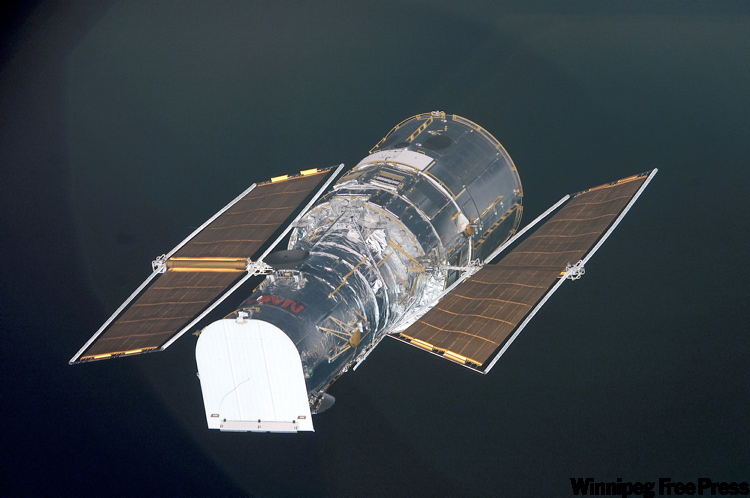Expansion of universe picking up speed: study
Hubble Space Telescope confirms Einstein theory
Advertisement
Read this article for free:
or
Already have an account? Log in here »
To continue reading, please subscribe:
Monthly Digital Subscription
$0 for the first 4 weeks*
- Enjoy unlimited reading on winnipegfreepress.com
- Read the E-Edition, our digital replica newspaper
- Access News Break, our award-winning app
- Play interactive puzzles
*No charge for 4 weeks then price increases to the regular rate of $19.00 plus GST every four weeks. Offer available to new and qualified returning subscribers only. Cancel any time.
Monthly Digital Subscription
$4.75/week*
- Enjoy unlimited reading on winnipegfreepress.com
- Read the E-Edition, our digital replica newspaper
- Access News Break, our award-winning app
- Play interactive puzzles
*Billed as $19 plus GST every four weeks. Cancel any time.
To continue reading, please subscribe:
Add Free Press access to your Brandon Sun subscription for only an additional
$1 for the first 4 weeks*
*Your next subscription payment will increase by $1.00 and you will be charged $16.99 plus GST for four weeks. After four weeks, your payment will increase to $23.99 plus GST every four weeks.
Read unlimited articles for free today:
or
Already have an account? Log in here »
Hey there, time traveller!
This article was published 27/03/2010 (5715 days ago), so information in it may no longer be current.
Nearly a century after Albert Einstein proposed that the expansion of the universe was happening faster, an international team of astronomers has used data collected from the Hubble Space Telescope to confirm the genius’s theory.
Scientists from North America and Europe, including Ludovic Van Waerbeke from the University of British Columbia, studied more than 446,000 galaxies and found that the universe is not only getting bigger, but its expansion is accelerating, a concept originally postulated in Einstein’s theory of relativity.
"This is an exciting step in Einstein’s work," said Van Waerbeke. "Our research shows that the universe is expanding faster and faster."

While Einstein’s theory has been proved correct before, until now, researchers had not been able to show that the theory held beyond the solar system, into whole galaxies and clusters of galaxies.
Van Waerbeke said the latest findings are the third, and most compelling, in a line of work that started 10 years ago when another team of scientists discovered that the cosmos were accelerating as they expanded.
"It took everyone by surprise. The principles of this seemed impossible," he said of the discovery a decade ago that went against all the known facts at the time.
Van Waerbeke said the only way to explain the data is if there is a previously unknown source of energy, which scientists have dubbed "dark energy."
Cosmologists now believe the universe is composed of three components: normal matter, which makes up all physical elements, such as humans and trees and the stars and the planets; dark matter, which is invisible to the eye, but the existence of which is known because of its gravitational pull; and the final component, dark energy, the force that causes the universe to expand.
Einstein’s theory of general relativity, a manuscript published by the former patent clerk in 1915, predicts that space and time are a geometric structure that is altered by the behaviour of the matter contained inside.
Van Waerbeke’s proof that cosmic expansion is speeding up is believed to show that the contents of the universe, such as the "dark energy" causing it to inflate, are influencing its structure.
"Our work confirmed that an unknown source of energy is causing the acceleration of cosmic expansion, stretching the universe, as predicted by Einstein’s theory," said Van Waerbeke.
Einstein’s theory is widely considered one of the most influential scientific advances. He won the Nobel Prize for physics in 1921.
Van Waerbeke, who pioneered a technique to measure the invisible web of dark matter, used 575 slightly overlapping views of the same part of the universe taken from the Hubble telescope.
The Hubble, which has produced some of the most spectacular images of the universe, is well suited to this type of survey because the space-based camera can avoid the blurring that happens when observations are made through the Earth’s atmosphere.
In a method similar to taking an X-ray of the body, Van Waerbeke’s technique, known as weak gravitational lensing, allows astronomers to see how light from distant galaxies is bent and distorted by the dark matter as it travels through the universe. They can then map the dark matter structures, which make up 80 per cent of the universe.
This data then allowed the team of scientists to test Einstein’s theory of general relativity.
"Our results were consistent, and showed no deviation from Einstein’s theories," said Van Waerbeke.
The study will be published in the journal Astronomy & Astrophysics.
— Canwest News Service

